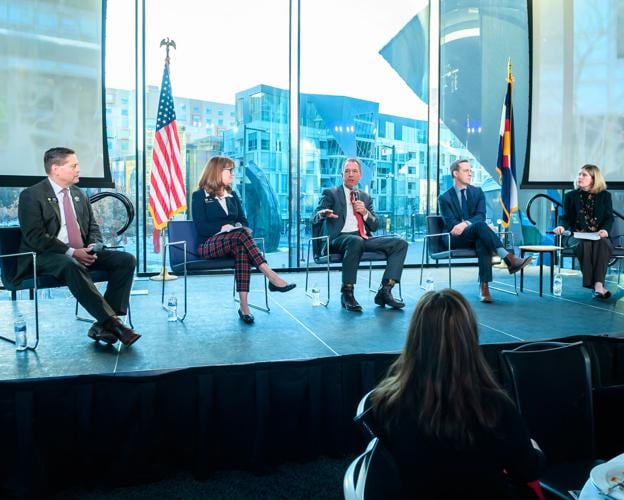Colorado legislative leaders vow civility as they seek to solve big problem in 2024 session

Colorado legislative leaders on a panel discussion for the Denver Metro Chamber of Commerce's Business Legislative Preview Tuesday at the Denver Art Museum. From left: House Minority Leader Mike Lynch, R-Wellington; House Speaker Julie McCluskie, D-Dillon; Senate Minority Leader Paul Lundeen, R-Monument; Senate President Steve Fenberg, D-Boulder; and moderator Bente Birkeland, CPR News.
Courtesy InSynch Photography/Denver Metro Chamber of Commerce
Colorado legislative leaders on Tuesday vowed to work together to tackle some of the biggest issues facing the state, including the lack of affordable housing, changes to the “construction defects” law, sustainability and rising cost of living.
Indeed, civility and bipartisan cooperation became the overarching themes on the eve of the legislative session that begins Wednesday, as lawmakers this year hope to accomplish milestones to help Colorado’s residents.
The legislative leaders — Senate President Steve Fenberg, D-Boulder; Senate Minority Leader Paul Lundeen, R-Monument; House Speaker Julie McCluskie, D-Dillon; and, House Minority Leader Mike Lynch, R-Wellington — spoke at the Denver Chamber of Commerce’s Business Legislative Preview at the Denver Art Museum.
“We will continue to operate with honor and dignity of the House, and hopefully the Senate,” McCluskie said. “We want to lift up civility and respectful debate in our conversations.”
McCluskie’s statements came on the heels of her issuing a letter of reprimand to Rep. Elisabeth Epps, the Denver Democrat who joined pro-Palestinian protesters in the gallery during special session in November and at one point called fellow lawmakers “fascist.” Epps’ actions halted work in her chamber.
The letter issued a sternly worded warning that such actions in the future could lead to more serious consequences.
But everyone was civil on Tuesday morning, when legislators spent an hour fielding questions from moderator Bente Birkeland, a public affairs reporter with CPR News and Colorado Public Radio.
When asked about his top priority, Lundeen said legislators need to back off overregulating businesses. He cited a study showing 65% of business owners said that is their No. 1 problem.
“Businesses are now telling us, ‘Not so much overregulation,’” Lundeen said. “The problems we’re creating for them from policy regulation needs to be dialed back.”
Lundeen added: “The trend is a canary in the coal mine, and we need to pay attention to it.”
By way of example, Bente mentioned that the downtown office building the Denver Metro Chamber is located in would need $6 million in improvements to “comply with state building performance standards.”
“They’d have to replace a lot of equipment that has decades of usability left,” Bente noted.
Lynch, from Weld County, a hub for oil and gas industry operations, said regulations are having a direct negative effect on the region’s economy.
“These regulations directly impact the economy of a good part of your state right now,” he said. “And what I keep on hearing from the folks involved, the stakeholders, the business owners is we can’t even keep up with the existing regulations.”
He added, “The good news, I guess, is the state can’t keep on top of enforcing them, either.”
Fenberg pushed back, saying laws — such as Senate Bill 181, whic regulates oil and gas companies — have made Colorado a healthier place to live.
“You know the part of the changes that we have seen is billions of dollars invested into Colorado,” Fenberg said. “I don’t think these massive corporations — some of the largest in the world — would be making those large business decisions and those moves if they felt like, at any moment, the industry was about to crumble because of these regulations.”
“I’m not saying there’s not a balance to be made, but we also have to recognize that, at times, we have some the worst air quality in the country. We have to take that seriously,” he said.
McCluskie agreed with Fenberg.
“I see businesses leading on this front in so many powerful ways, particularly when it comes to the sustainability of our state,” she said. “I live up in in Summit County. We completely electrified our mass transit, thanks to some of the infrastructure, bipartisan infrastructure dollars, coming down from the feds. What a powerful way to impact local air quality.”
The legislators talked about tackling the “construction defects” law to allow more condominiums to be built, as that’s usually the first home that buyers can afford.
Bente asked how open Democrats are to that idea.
“I think a lot of Democrats are open to it,” Fenberg said. “In fact, I think you’re going to see legislation this year sponsored by Democrats on this topic, but it is going to have to have the support of Republicans to get across the finish line.”
“Just simply building more in a way that creates sprawling communities isn’t the answer,” he said. “We have to do things to encourage and incentivize local governments and communities, and developers to work together to do it in a way that that makes sense for the state.”
The theme of working together came up repeatedly, with legislators encouraging face-to-face discussions, listening to opposing points of view and getting off social media.
The audience applauded when McCluskie said the Colorado Municipal League is working on a civility initiative.
“I want to see that kind of commitment to respectful, honest discourse, regardless of whether you’re in that building or outside of it,” she said. “But it has to be a commitment that we make in all sectors of our communities and with our youth. And certainly you must know — just say no to Twitter.”





